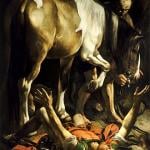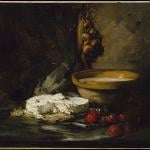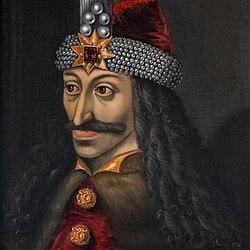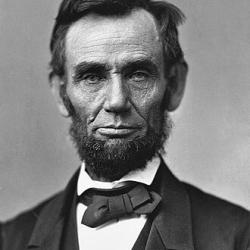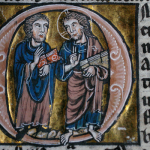Last Time on HOARATS
The 1890’s is the decade that ends the 19th century and precedes the 20th century. It was the first full decade that gave us cinema, the adventures of Sherlock Holmes, Coke-a-Cola, The Story of a Soul, The Lizzie Borden murders, several new states that were added to the United States, the Boxer Rebellion and more. If you like history and want to get a quick birds eye view of a unique period of history come and
enter into the 1890’s
where…
Benjamin Harrison (1833–1901)
was president of the United States
March 4, 1889 -–March 4, 1893
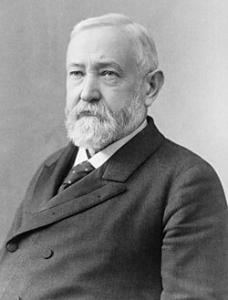
Pope # 256 Leo XIII (March 2, 1810 – July 20, 1903)
was the supreme pontiff of the Roman Catholic Church
Papal Reign from February 20, 1878 – July 20, 1903
(25 years, 150 days)
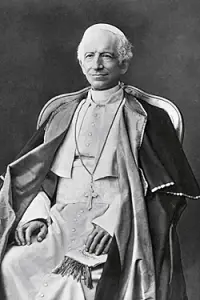
Now we enter the Gay Nineties
1890
Picture This
c. 1890 –James Tissot The Magi Journeying Brooklyn Museum New York City
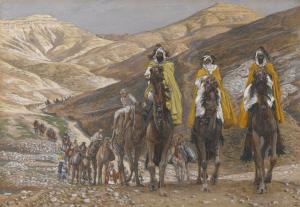
1890 – The Mystery of Sleep Noon – Rest from Work by Vincent van Gogh (after Millet) Noon, rest from work – Van Gogh – Sleep – Wikipedia
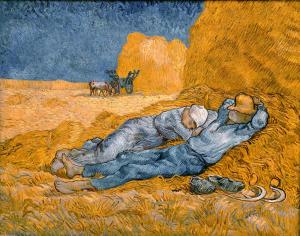
Walking on Water, by Ivan Aivazovsky (1890)
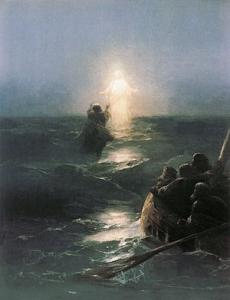
Christ in Gethsemane (1890)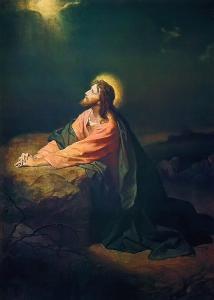
News of the World
- January 2 – Alice Sanger becomes the first female staffer in the White House.
- February 18 – The National American Woman Suffrage Association (NAWSA) is founded by Elizabeth Cady Stanton and Susan B. Anthony.
- May 2 – President Benjamin Harrison signs the Oklahoma Organic Act, under which Oklahoma Territory is organized, a prerequisite for later statehood.
- June 1 – The United States Census Bureau begins using Herman Hollerith‘s tabulating machine to tabulate census returns using punched card input, a landmark in the history of computing hardware. Hollerith’s company eventually becomes IBM. The 1890 United States census determines the US population to be 62,979,766, an increase of 25.5 percent relative to the 1880 census.
- July 3 – Idaho is admitted as the 43rd U.S. state.
- July 10 – Wyoming is admitted as the 44th U.S. state.
- September 25 — President Wilford Woodruff of the Church of Jesus Christ of Latter-day Saints issues the 1890 Manifesto ending the official practice of polygamy.
- October 1 – The Yosemite National Park is established in California.
Arrivals
- Robert Ripley, (February 22, 1890 – May 27, 1949)American cartoonist, publisher, and businessman, founded Ripley’s Believe It or Not!
- Charles Frederick Urschel (March 7, 1890 – September 26, 1970) was an American oil business tycoon and kidnap victim of George “Machine Gun” Kelly.Urschel eventually helped solve the crime himself by carefully noting every piece of evidence of his whereabouts during his captivity despite being blindfolded, and leaving fingerprints on every surface he could reach. After being released after the ransom was delivered, Urschel was able to supply ample information for the FBI to solve the crime
- Stan Laurel (June 16, 1890 – February 23, 1965)
- H. P. Lovecraft (August 20, 1890 – March 15, 1937) Horror Writer
- Dame Agatha Christie (September 15, 1890 –January 12, 1976) Best Selling Mystery Author
- Groucho Marx (October 2, 1890 – August 19, 1977)
- Eddie Rickenbacker (October 8, 1890 – July 23, 1973) was an American fighter pilot in World War I and a Medal of Honor recipient.[1][2] With 26 aerial victories, he was the most successful and most decorated United States flying ace of the war. He was also a racing driver, an automotive designer, and a long-time head of Eastern Air Lines.
- Aimee Elizabeth Semple McPherson (October 9, 1890 – September 27, 1944), also known as Sister Aimee or Sister, was a Canadian Pentecostal evangelist and media celebrity in the 1920s and 1930s, famous for founding the Foursquare Church.
- St. Maria Goretti (October 16, 1890 – July 6, 1902: Aged 11)
Departures
- Carlo Collodi (November 24, 1826 – October 26, 1890),
- Henri Nestlé (August 10, 1814 – July 7, 1890)
- Vincent van Gogh,(March 30, 1853 – July 29, 1890)
- John Henry Newman (February 21, 1801 –August 11, 1890)
- Michael Joseph McGivney (August 12, 1852 – August 14, 1890)
- Louis Le Prince (August 28, 1841 – disappeared September 16, 1890,declared dead 16 September 1897)
- Sitting Bull (c. 1837 – December 15, 1890)
London’s Trafalgar Square is an 1890 British short silent actuality film, shot by inventors and film pioneers Wordsworth Donisthorpe and William Carr Crofts at approximately 10 frames per second with an oval or circular frame on celuloid film using their ‘kinesigraph’ camera, showing traffic at Trafalgar Square in London. The surviving ten frames of film are the earliest known motion picture of the city. London’s Trafalgar Square | W. Donisthorpe & W. C. Crofts | 1890 (youtube.com)
Publications Hot of the Press
- July 13, 1890 – Ambrose Bierce‘s short story “An Occurrence at Owl Creek Bridge“, one of his best known works, is first published, in The San Francisco Examiner.
- July–August – Bram Stoker holidays with his family at Whitby on the north-east coast of England and from the library there reads William Wilkinson’s An Account of the Principalities of Wallachia and Moldavia, all of which feed into his composition of Dracula
- Arthur Conan Doyle
- The Firm of Girdlestone
- The Sign of Four (Sherlock Holmes book-length story originally published as The Sign of the Four in Lippincott’s Monthly Magazine dated February)
- Oscar Wilde – The Picture of Dorian Gray (in Lippincott’s Monthly Magazine dated July)
Good Sports
- November 29, 1890— The first Army–Navy Game is played. Navy wins 24–0.
- Formation of the Union des Sociétés Françaises de Sports Athlétiques (USFSA), the principal governing body of football in France until 1919 when it is superseded by the Fédération Française de Football (FFF).
Sanctifying Time
- Saint John Damascene is proclaimed Doctor of the Church
- Catholicae Ecclesiae – On Slavery in the Missions, by Pope Leo XIII, 20 November 1890
The Sound of Music and Other Cultural Milestones
- January 15, 1890 – Pyotr Ilyich Tchaikovsky‘s The Sleeping Beauty (ballet) premieres at the Mariinsky Theatre in St. Petersburg.
- January–June period, 1890 – George W. Johnson becomes the first African American to record phonograph cylinders, in New York.
- Star of the East (1890) originally named “Stern über Bethlehem” is a popular Christmas carol.
1891
Picture This
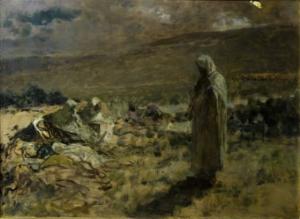
Christ watches over the Apostles (1891)
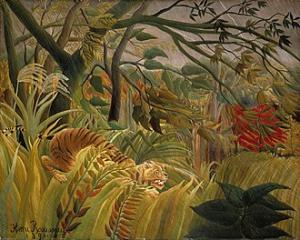
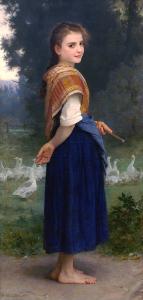
William-Adolphe Bouguereau (1825-1905)
The Goose Girl (1891)
News of the World
- January 29 – Liliuokalani is proclaimed Queen of Hawaii.
- March 9–12 – The Great Blizzard of 1891 in the south and west of England leads to extensive snow drifts and powerful storms off the south coast, with 14 ships sunk, and approximately 220 deaths attributed to the weather conditions.
- May – Mirza Ghulam Ahmad claims to be the Promised Messiah (the second coming of Jesus) and the Mahdi awaited in Islam.
- June 21 – The first long-distance transmission of alternating current is made, from the Ames power plant near Telluride, Colorado, by Lucien and Paul Nunn.
- December 22 – Asteroid 323 Brucia becomes the first asteroid discovered using photography.
Arrivals
- David Sarnoff (February 27, 1891 – December 12, 1971) He headed a conglomerate of telecommunications and media companies, including RCA and NBC, that became one of the largest in the world.
- Blessed Laura Vicuña (April 5, 1891 – January 22, 1904: Aged 12) ) was a Chilean child who was noted for her religious devotion.
- Ruth Plumly Thompson (July 27, 1891 –April 6,1976) was an American writer of children’s stories, best known for writing many novels placed in Oz, the fictional land of L. Frank Baum‘s classic children’s novel The Wonderful Wizard of Oz and its sequels.
- Joe E. Brown (July 28, 1891 – July 6, 1973) was an American actor and comedian, remembered for his friendly screen persona, comic timing, and enormous, elastic-mouth smile.
- Saint Teresa Benedicta of the Cross (October 12, 1891 – 9 August 1942) was a German philosopher who converted to Catholicism and became a Discalced Carmelite nun. Edith Stein was murdered in the gas chamber at the concentration camp Auschwitz II-Birkenau on August 9, 1942, and is canonized as a martyr and saint of the Catholic Church; she is also one of six patron saints of Europe.
- Edouard Izac (December 18, 1891 – January 18, 1990) At the time of his death in 1990, he was the last living Medal of Honor recipient from World War I.
Departures
- Leonard Jerome, American entrepreneur, grandfather of Sir Winston Churchill (d. 1817 – 1891)
- Sofya Kovalevskaya (January 3, 1850 – 10 February 10, 1891) was a Russian mathematician who made noteworthy contributions to analysis, partial differential equations and mechanics. She was a pioneer for women in mathematics around the world – the first woman to earn a doctorate (in the modern sense) in mathematics, the first woman appointed to a full professorship in northern Europe and one of the first women to work for a scientific journal as an editor. According to historian of science Ann Hibner Koblitz, Kovalevskaya was “the greatest known woman scientist before the twentieth century”
- Herman Melville (American) (August 1, 1819 – September 28, 1891) author of Moby Dick.
- (Phineas Taylor) P. T. Barnum (July 5, 1810 – April 7, 1891) was an American showman, businessman, and politician remembered for promoting celebrated hoaxes and founding with James Anthony Bailey the Ringling Bros. and Barnum & Bailey Circus.
Newark Athlete is an 1891 American short silent film directed and produced by William Kennedy Dickson. The film, roughly ten seconds in length, displays a young athlete swinging Indian clubs. In 2010, Newark Athlete was selected for preservation in the United States National Film Registry by the Library of Congress as being “culturally, historically, or aesthetically significant”. It is currently the oldest film chosen to be in the Registry
Publications Hot of the Press
- January – The Strand Magazine is first published in London. On June 25 Arthur Conan Doyle‘s private consulting detective Sherlock Holmes appears in it for the first time, in the story “A Scandal in Bohemia” (issue dated July).
- April – Oscar Wilde‘s novel The Picture of Dorian Gray is first published in book format by Ward and Lock in London with the aphoristic preface originally published in the March 1 issue of The Fortnightly Review.
- May – William Morris establishes the Kelmscott Press as a private press at Hammersmith (London) and produces its first book, the first edition in book format of his fantasy novel The Story of the Glittering Plain.
- June 25 – Arthur Conan Doyle‘s detective Sherlock Holmes appears in The Strand Magazine (London) for the first time, in the issue dated July.
- July 1 – The International Copyright Act of 1891 comes into effect in the United States, permitting foreign authors to register their works for copyright. On July 3, the first such work, the play Saints and Sinners by English author Henry Arthur Jones, is registered.
- July 4–December 26 – Thomas Hardy‘s novel Tess of the d’Urbervilles is serialized in expurgated form in the weekly illustrated newspaper The Graphic (London); in November the first (unexpurgated) book edition is published in London.
- Laura E. Richards – Captain January
Good Sports
- Kansas defeats Missouri in the first Border War game 22-10 beginning one of the oldest and most fierce college football rivalries.
- The Canadian Rugby Union (CRU) is formed as the new governing body of the sport. It lasts until the birth of the CFL in 1958.
Sanctifying Time
- May 15 – Pope Leo XIII issues the encyclical Rerum novarum, on the rights and duties of capital and labor, resulting in the creation of many Christian Democrat parties throughout Europe.
- Pastoralis – On Religious Union, by Pope Leo XIII, 25 June 1891
- Pastoralis Officii – On the Morality of Dueling, by Pope Leo XIII, 12 September 1891
- Octobri Mense – On the Rosary, Pope Leo XIII, 22 September 1891
- Miraculous cures at Lourdes of Amelie Chagnon, Clemintine Trouve, Marie Lebranchu Wiuplier, Marie Lemarchand Authier, Elise Lesage, and Sister Marie de la Presentation
The Sound of Music and Other Cultural Milestones
- February 23, 1891 – Fourteen-year-old cellist Pablo Casals gives a solo recital in Barcelona
- June 24, 1891 – Pyotr Ilyich Tchaikovsky finished his ballet The Nutcracker
- October 16, 1891 – The Chicago Symphony Orchestra gives its inaugural concert.
- “Ta-ra-ra-boom-de-ay” w.m. Henry J. Sayers
1892
Picture This
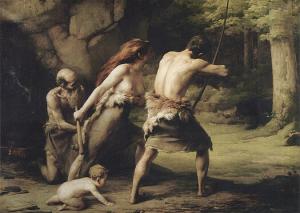
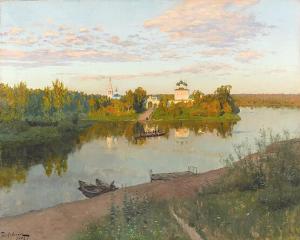
News of the World
- January 1 – Ellis Island begins processing immigrants to the United States.
- March 17 – The St. Patrick’s Day Snowstorm besieges Tennessee with upwards of 26 inches of snow, establishing accumulation records that still stand.
- August 4, 1892 – The father and stepmother of Lizzie Borden are found murdered in their Fall River, Massachusetts home; she will be acquitted of their murder.
- August 9 – Thomas Edison receives a patent for a two-way telegraph.
- October 12 – To mark the 400th anniversary Columbus Day holiday, the “Pledge of Allegiance” is first recited in unison by students in U.S. public schools.
Arrivals
- J. R. R. Tolkien (January 3, 1892 – 2 September 2, 1973) author of Lord of the Rings.
- Hal Roach (January 14, 1892 – November 2, 1992)
- Oliver Hardy January 18, 1892 – August 7, 1957)
- Servant of God Eileen Rosaline O’Connor (February 19, 1892 – January 10, 1921)
- Mary Pickford, (April 8, 1892 – May 29, 1979Canadian-American actress, producer, screenwriter and co-founder of United Artists is born (d. 1979)
- Jack L. Warner (August 2, 1892 – September 9, 1978)
- Henry Johnson (World War I soldier) (circa July 15, 1892 – July 1, 1929),
Departures
Alexander Cartwright (April 17, 1820 – July 12, 1892) He was a founding member of the New York Knickerbockers Base Ball Club in the 1840s. Although he was an inductee of the Baseball Hall of Fame and he was sometimes referred to as a “father of baseball,” the importance of his role in the development of the game has been disputed. Alexander Cartwright Facts for Kids
Pauvre Pierrot (or Poor Pete) is a French short animated film directed by Charles-Émile Reynaud in 1891 and released in 1892. It consists of 500 individually painted images and lasts about 15 minutes originally. Poor Pete (1892) Émile Reynaud (youtube.com)
Hot of the Press
- September 12 – The 11-year-old Virginia Stephen, the later novelist Virginia Woolf, takes a boat trip to Godrevy Lighthouse on a family holiday in Cornwall.
- October 14 – The first collection of Arthur Conan Doyle‘s Sherlock Holmes stories from The Strand Magazine (June 1891–June 1892), The Adventures of Sherlock Holmes, is published by George Newnes in London; it includes Doyle’s favourite, “The Adventure of the Speckled Band“, which was originally published in February.
- Carlo Collodi‘s The Adventures of Pinocchio is translated into English for the first time, by Mary Alice Murray.
- Robert Louis Stevenson and Lloyd Osbourne – The Wrecker
- Mark Twain – The American Claimant more
- Mary Eleanor Wilkins Freeman
- Brandon Thomas – Charley’s Aunt
Good Sports
- September 28, 1892 – The first night football game is attempted between Wyoming Seminary and Mansfield State
- November 12, 1892– Pudge Heffelfinger is paid $500 by the Allegheny Athletic Association to play in a game against the Pittsburgh Athletic Club. He is considered the first professional football player of all time.
- The “National League and American Association” is the sole major league in baseball after incorporating four clubs from the former American Association into the expanded and restructured National League and buying out the four others.
- January 15, 1892 – James Naismith‘s rules for basketball are published for the first time in the Springfield YMCA International Training School’s newspaper, in an article titled “A New Game.” They said it was called “Basketball.”
- March 11, 1892 – First basketball game played in public, between students and faculty at the Springfield YMCA. The final score was 5–1 in favor of the students, with the only goal for the faculty being scored by Amos Alonzo Stagg. A crowd of 200 spectators watched the game.
Sanctifying Time
- Custodi di Quella Fede – On Freemasonry, by Pope Leo XIII, 8 December 1892
- Inimica Vis – On Freemasonry, by Pope Leo XIII, 8 December 1892
- Magnae Dei Matris – On The Rosary, by Pope Leo XIII, 8 September 1892
- Quarto Abeunte Saeculo – On the Columbus Quadri-Centennial, by Pope Leo XIII, 16 July 1892
The Sound of Music and Other Cultural Milestones
- “After the Ball” becomes the first sheet music to sell over 1 million copies (for a single publisher in a single year).
- “Daisy Bell” (aka “A Bicycle Built For Two”) w.m. Harry Dacre
1893
Picture This
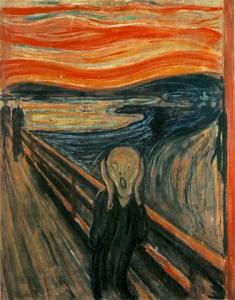
News of the World
- President: Benjamin Harrison (R–Indiana) (until March 4)
Grover Cleveland (D–New York) (starting March 4)
- January 2 – Webb C. Ball introduces railroad chronometers, which become the general railroad timepiece standards in North America.
- January 6 – The Washington National Cathedral is chartered by Congress; the charter is signed by President Benjamin Harrison.
- January 17 – Overthrow of the Kingdom of Hawaii: Lorrin A. Thurston and the Citizen’s Committee of Public Safety in Hawaii, with the intervention of the United States Marine Corps, overthrow the government of Queen Liliuokalani.
- May 1 – The 1893 World’s Fair, also known as the World’s Columbian Exposition, opens to the public in Chicago, Illinois. The first United States commemorative postage stamps are issued for the event.
- May 23 – Gandhi arrives in South Africa, where he will live until 1914, lead non-violent protests on behalf of Indian immigrants in the South African Republic (Transvaal), and develop a deeper experience of such activities.
- June 17 – Gold is found in Kalgoorlie, Western Australia.
- June 20 – Lizzie Borden is found not guilty for the murder of her father and step-mother in New Bedford, Massachusetts.
- July 1 – U.S. President Grover Cleveland has a secret operation to remove cancer in his mouth.
- August 14 – The world’s first driving licenses are introduced in France under the Paris Police Ordinance.
- September 19 -New Zealand becomes the first country in the world to grant women’s suffrage.
- September 21 – Brothers Charles and Frank Duryea drive the first gasoline-powered motorcar in America, on public roads in Springfield, Massachusetts.
- December – Carl Anton Larsen becomes the first man to ski in Antarctica.
Arrivals
- Dorothy L. Sayers (1893 – 1957)
- Gummo Marx, (October 23, 1892 – April 21, 1977) American vaudevillian and talent agent dies.
- Harold Lloyd (April 20, 1893 – March 8, 1971) Silent Movie Comedy Legend
- Mao Zedong (December 26, 1893 –September 9, 1976)
Departures
- Pyotr Ilyich Tchaikovsky (1840-1893)
- Edwin Booth, American tragedian (November 13, 1833 – June 7, 1893)
- Guy de Maupassant (August 5, 1850 – July 6 1893–French short story writer, novelist, and poet
The brothers, Joseph Brooks (1802–1835), George (1805–1875) and Edward (1814–1893), founded their establishment at Otago Heads in 1831, the first enduring European settlement in what is now the City of Dunedin. The Weller brothers, Englishmen of Sydney, Australia, and Otago, New Zealand, were the founders of a whaling station on Otago Harbour and New Zealand’s most substantial merchant traders in the 1830s.
February 1, 1893 – Thomas A. Edison finishes construction of the first motion picture studio in West Orange, New Jersey. the Black Maria
Blacksmith Scene (also known as Blacksmith Scene #1 and Blacksmithing Scene) is an 1893 American short black-and-white silent film directed by William K.L. Dickson, the Scottish–French inventor who, while under the employ of Thomas Edison, developed one of the first fully functional motion picture cameras. It is historically significant as the first Kinetoscope film shown in public exhibition on May 9, 1893, and is the earliest known example of actors performing a role in a film. 102 years later, in 1995, Blacksmithing Scene was selected for preservation in the United States National Film Registry by the Library of Congress as being “culturally, historically, or aesthetically significant”. It is the second-oldest film included in the Registry, after Newark Athlete (1891).
Publications Hot of the Press
- February/March – The 22-year-old Stephen Crane pays for publication of his first book, the Bowery novella Maggie: A Girl of the Streets, under the pseudonym “Johnston Smith” in New York. Coming to be considered a pioneering example of American literary realism, the first trade edition (rewritten) comes out in 1896 after Crane has attained fame with The Red Badge of Courage.
- November 26 – Arthur Conan Doyle surprises the reading public by revealing in the story “The Adventure of the Final Problem“, published in The Strand Magazine dated December, that his private detective character Sherlock Holmes had apparently died at the Reichenbach Falls on 4 May 1891. Doyle has stayed in Switzerland for a time this year.
- December – W. B. Yeats publishes The Celtic Twilight, giving a popular name to the Irish Literary Revival.
- Robert Louis Stevenson
- Catriona
- Island Nights’ Entertainments (three stories)
- December
- Mark Twain‘s Pudd’nhead Wilson begins serialization in The Century Magazine (U.S.)
Good Sports
- Beginning in 1893, the National League’s championship pennant is awarded to the first–place club in the standings at the end of the season. The Boston Beaneaters takes the 1893 title and there is no post–season play–off series.
- The pitcher‘s rubber replaces the box and the effective distance from home plate increases from 55 feet to 60 feet, 6 inches.
- April 8, 1893– first college basketball game takes place in Beaver Falls, Pennsylvania where Geneva College defeats New Brighton YMCA
Sanctifying Time
November 18 1893 – Providentissimus Deus, “On the Study of Holy Scripture“, was an encyclical letter issued by Pope Leo XIII . In it, he reviewed the history of Bible study from the time of the Church Fathers to the present, spoke against the errors of the Rationalists and “higher critics“, and outlined principles of scripture study and guidelines for how scripture was to be taught in seminaries. He also addressed the issues of apparent contradictions between the Bible and physical science, or between one part of scripture and another, and how such apparent contradictions can be resolved.
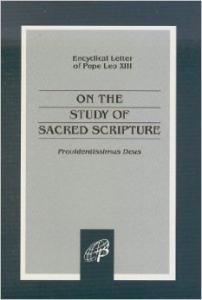
- Archbishop Francesco Satolli appointed as the Vatican’s first Apostolic Delegate to the United States
The Sound of Music and Other Cultural Milestones
American sisters Patty and Mildred J. Hill publish Song Stories for the Kindergarten including “Good Morning to All”, which later becomes known as “Happy Birthday to You“.
1894
Picture This
Olga Boznańska – Girl with Chrysanthemums
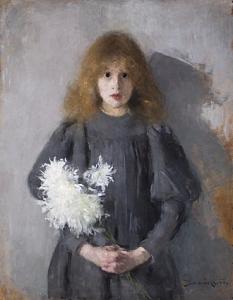
Stanisław Wyspiański – Planty Park at Dawn
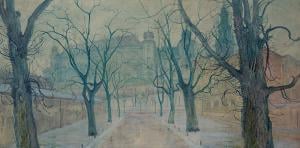
Henry Ossawa Tanner – The Thankful Poor
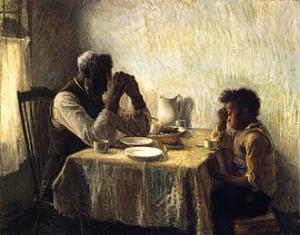
The Adoration of the Shepherds
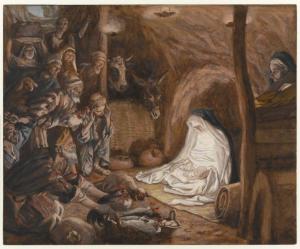
What Our Lord Saw from the Cross
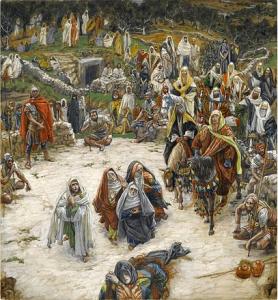
News of the World
- January 7 – William Kennedy Dickson receives a patent for motion picture film in the United States.
- February 12 – French anarchist Émile Henry sets off a bomb in a Paris café, killing one person and wounding twenty.
- March 12 – Coca-Cola is sold in bottles for the first time.
- July 16 – The United Kingdom and Japan sign the Anglo-Japanese Treaty of Commerce and Navigation, as the U.K. becomes the first of the Western nations to agree to give up its extraterritorial rights in Japan.
Arrivals
- Aldous Huxley (July 26, 1894 – 22 November 22, 1963) Author of Brave New World (1932)
- Jack Benny (1894–1974)
- Norman Rockwell (February 3, 1894 – November 8, 1978)
- Maximilian Maria Kolbe OFMConv (1894–1941)
- John Ford (February 1, 1894 – August 31, 1973)
- Walter Brennan (July 25, 1894 – September 21, 1974)
- Laurence Stallings (November 25, 1894 – February 28, 1968)
- Dashiell Hammett May 27, 1894 – January 10, 1961)
- E. C. Segar (December 8, 1894 – October 13, 1938) The character of Popeye created first appeared in 1929 in Segar’s comic strip Thimble Theatre.
Departures
- Robert Louis Stevenson (November 13, 1850 – 3 December 3, 1894)
- Louis Martin (August 22, 1823 –July 29, 1894)
Fred Ott’s Sneeze (1894)
Publications Hot of the Press
Tom Sawyer Abroad (1894)
- Robert Louis Stevenson and Lloyd Osbourne – The Ebb-Tide
- Mark Twain
- Jules Verne – Captain Antifer
- H. G. Wells – “The Red Room“
- Rudyard Kipling – The Jungle Book
- E. Nesbit – Miss Mischief
- Margaret Marshall Saunders – Beautiful Joe
- Ethel Turner – Seven Little Australians
- November 1 -The first issue of Billboard magazine is published in Cincinnati, Ohio by William Donaldson and James Hennegan. Initially, it covers the advertising and bill posting industry, and is at the time known as Billboard Advertising.
- November 8 – Robert Frost‘s first poem, “My Butterfly” appears in The New York Independent, which pays him $15.
- Arthur Conan Doyle publishes “An Alpine Pass on “Ski”” in The Strand Magazine (London), popularizing skiing as a sport in Switzerland.
- December – An abridgement of Stephen Crane‘s American Civil War novel The Red Badge of Courage is first published as a serial in The Philadelphia Press.
Good Sports
- The 1894 Harvard–Yale game, known as the “Hampden Park Blood Bath”, results in crippling injuries for four players; the contest is suspended until 1897. The annual Army–Navy Game is suspended from 1894 till 1898 for similar reasons. One of the major problems is the popularity of mass formations like the flying wedge, in which a large number of offensive players charge as a unit against a similarly arranged defense. The resultant collisions often lead to serious injury and sometimes even death.
- 1894 is Major League Baseball‘s highest scoring season as Boston Beaneaters set the current record for the most runs scored in a season (1220) and another standing record with seven players scoring 100 or more runs; in addition, Philadelphia Phillies bat .349 for the season with all four outfielders above .400, but finish fourth despite the feat
Sanctifying Time
- Inter Graves – The Church in Peru, by Pope Leo XIII, 1 May 1894
- Iucunda Semper Expectatione – On the Rosary, by Pope Leo XIII, 8 September 1894
- Litteras a Vobis – On the Clergy in Brazil, by Pope Leo XIII, 2 July 1894
- My Song of Today, by Saint Thérèse of Lisieux
- Orientalium Dignitas – On the Churches of the East, by Pope Leo XIII, 30 November 1894
- Praeclara Gratulationis Publicae – Reunion of Christendom, by Pope Leo XIII, 20 June 1894
The Sound of Music and Other Cultural Milestones
“The Sidewalks of New York” is a popular song about life in New York City during the 1890s. It was composed in 1894 by vaudeville actor and singer Charles B. Lawlor (June 2, 1852 – May 31, 1925) with lyrics by James W. Blake (September 23, 1862 – May 24, 1935). It was an immediate and long-lasting hit and is often considered a theme for New York City.
I’ve Been Working on the Railroad
1895
Picture This
J. Alden Weir – The Ice Cutters
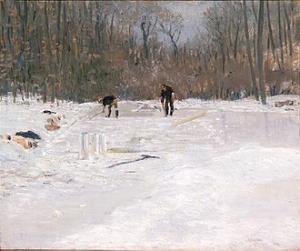
Sir Frederic Leighton –Flaming June

News of the World
The Mystery of the Multiverse The concept of The multiverse first appeared in the modern scientific context in the course of the debate between Austrian physicist and philosopher Ludwig Eduard Boltzmann (February 20, 1844 – September 5, 1906) and German logician and mathematician Ernst Friedrich Ferdinand Zermelo ( July 27, 1871 –May 21, 1953).
- February 20 – The gold reserve of the U.S. Treasury is saved when J. P. Morgan and the Rothschilds loan $65 million worth of gold to the United States government. The offering of syndicate bonds sells out only 22 minutes after the New York market opens, and just two hours after going on sale in London
- March 15 – Murder of Bridget Cleary Bridget Cleary (February 19, 1869 – March 15, 1895) was an Irish woman who was murdered by her husband. She was either immolated or her body was set on fire immediately after her death. The husband’s stated motive was his belief that she had been abducted by fairies and replaced with a changeling, which he then killed. The gruesome nature of the case prompted extensive press coverage, and the trial was closely followed by newspapers across Ireland.
- March 18 – The world’s first gasoline bus route is started in Germany, between Siegen and Netphen.
- April 27 – The unique, historic and picturesque Spiral Bridge is constructed to carry U.S. 61 over the Mississippi River at Hastings, Minnesota. It is demolished in 1951.
Arrivals
- January 1 – J. Edgar Hoover, American Federal Bureau of Investigation director (d. 1972)
- February 6 – Babe Ruth, American baseball player (d. 1948)
- March 11 – Shemp Howard, American actor, comedian (The Three Stooges) (d. 1955)
- May 6 – Rudolph Valentino, Italian actor (d. 1926)
- May 8 – Fulton J. Sheen, American Catholic archbishop, television personality (d. 1979)
- July 24 – Robert Graves, English writer (d. 1985)
- July 26 – Gracie Allen, American actress and comedian (d. 1964)
- October 4 – Buster Keaton, American actor, film director (d. 1966)
Departures
Ephraim Wales Bull
(March 4, 1806 – September 26, 1895)
He was an American farmer, best known for the creation of the Concord grape.
Fr. Ányos Jedlik
(January 11, 1800 – December 13, 1895)
He was a Hungarian inventor, engineer, physicist, and Benedictine priest. He was also a member of the Hungarian Academy of Sciences, and author of several books. He is considered by Hungarians and Slovaks to be the unsung father of the dynamo and electric motor.
Frederick Douglass
(c. February 1817 or February 1818– February 20, 1895)
Escaped slave and popular writer and speaker Frederick Douglass was appointed the United States’s minister resident and consul-general to the Republic of Haiti and Chargé d’affaires for Santo Domingo by President Benjamin Harrison himself in 1889.
Louis Pasteur
(December 27, 1822 – September 28, 1895)
He was a French chemist, pharmacist, and microbiologist renowned for his discoveries of the principles of vaccination, microbial fermentation, and pasteurization, the last of which was named after him. His research in chemistry led to remarkable breakthroughs in the understanding of the causes and preventions of diseases, which laid down the foundations of hygiene, public health and much of modern medicine. Pasteur’s works are credited with saving millions of lives through the developments of vaccines for rabies and anthrax. He is regarded as one of the founders of modern bacteriology and has been honored as the “father of bacteriology” and the “father of microbiology“(together with Robert Koch; the latter epithet also attributed to Antonie van Leeuwenhoek).
L’Arroseur Arrosé, directed by Louis Lumiere. May be the first outdoor comedy film ever made.
- March 22 – Brothers Auguste and Louis Lumière make what is probably the first presentation of a projected celluloid film moving picture, the 46-second Workers Leaving the Lumière Factory, to members of the Société d’encouragement pour l’industrie nationale in Paris.
- December 28 – The Lumière brothers have their first paying audience at the Grand Café Boulevard des Capucines in Paris — this date is sometimes considered the debut of the motion picture as an entertainment medium. Lumiere, Auguste & Louis – Primi film (1895) (youtube.com)
Publications Hot of the Press
- January–May – H. G. Wells‘ first “scientific romance“, the novella The Time Machine, is published serially in The New Review (London). The first book editions are published by the Henry Holt and Company in New York on May 7 and by Heinemann in London on May 29.
- November 1 – Thomas Hardy‘s last completed novel, Jude the Obscure is published by Osgood, McIlvaine, and Co. in London, dated 1896, on completion of an expurgated serialization under the title Hearts Insurgent in Harper’s Magazine. It is strongly criticized on moral grounds. Hardy later claims that Walsham How, Bishop of Wakefield, burned a copy.
- c. December – Ioseb Besarionis dze Jughashvili, the future Joseph Stalin, publishes his romantic poems in the newspaper Iveria, receiving accolades from a senior writer, Ilia Chavchavadze.
- Stephen Crane – The Red Badge of Courage
- Henryk Sienkiewicz – Quo Vadis
- Henry-Van Dyke -The Story of the Other Wise Man”
- Lewis Carroll – Sylvie and Bruno
- G. E. Farrow – The Wallypug of Why
- Rudyard Kipling
- Mary Louisa Molesworth (Mrs. Molesworth) – The Carved Lions
- Emilio Salgari – I Misteri della Jungla Nera (The Mystery of the Black Jungle – first in the Sandokan series of eleven books)
Good Sports
- The Paris–Bordeaux–Paris race is held and is the first real motor race as all competitors start together. The first to arrive is Émile Levassor in a two-cylinder 4 bhp (3.0 kW; 4.1 PS) 1,205 cc (73.5 cu in) Panhard-Levassor. He completes the course in 48 hours and 48 minutes, finishing nearly six hours before the runner-up. Levassor’s was disqualified, having only two seats, instead of the required four. The official winner is Paul Koechlin, the third to arrive, 11 hours after Levassor;[9] he is awarded a Fr31,000 prize. Among the other entrants was André Michelin in a Peugeot, on his company’s pneumatic tires; he suffered numerous blowouts.[11] The race is in retrospect sometimes referred to as the I Grand Prix de l’ACF.[12] The event proves cars and their drivers can travel very long distances in a reasonable time. It gives an enormous boost to the motor industry and the enthusiastic public interest in the event ensures the popularity of motor racing as a sport.
- May 18 – The first motor race in Italy is held, on a course from Turin to Asti and back, a total of 93 km (58 mi). Five entrants start the event; only three complete it. It is won by Simone Federman in a four-seat Daimler Omnibus, at an average speed of 15.5 km/h (9.6 mph).
- Veteran player Bud Fowler and the Page Woven Wire Fence Company organise the Page Fence Giants, a black professional team touring out of Adrian, Michigan. Economic depression in the 1890s has eliminated all but the Cuban Giants in New York City and neighboring states.
Sanctifying Time
- Amantissima Voluntatis – To The English People, by Pope Leo XIII, 27 April 1895
- Longinqua – On Catholicism in the United States, by Pope Leo XIII, 6 January 1895
- Permoti Nos – On Social Conditions in Belgium, by Pope Leo XIII, 10 July 1895
The Sound of Music and Other Cultural Milestones
- “America the Beautiful” w. Katherine Lee Bates m. Samuel A. Ward
- “The Band Played On” w. John F. Palmer m. Charles B. Ward
- “Put Me Off at Buffalo” w. Harry Dillon m. John Dillon (Dillon Brothers)
1896
Picture This
Michael Ancher – A stroll on the beach
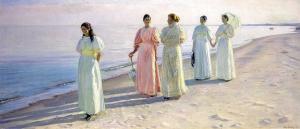
Pablo Picasso – First Communion
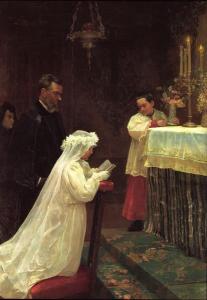
News of the World
- January 4 – Utah is admitted as the 45th U.S. state.
- – Murder of Pearl Bryan c. 1874–1896) was a 22-year-old pregnant American woman from Greencastle, Indiana who was found decapitated in Fort Thomas, Kentucky. Her head was severed below the fifth vertebra. Due to the murder’s gruesome nature, it achieved significant notoriety at the time. More recently, there have been claims that her ghost haunts Bobby Mackey’s Music World located in Wilder, Kentucky.
- January 12 – H. L. Smith takes the first X-ray photograph.
- May 18 – Plessy v. Ferguson: The U.S. Supreme Court introduces the separate but equal doctrine, and upholds racial segregation.
- June 4 – The Ford Quadricycle, the first vehicle developed by Henry Ford, is completed, eventually leading Ford to build the empire that “put America on wheels”.
- June 18 – The New York Telephone Company is formed, succeeding the Metropolitan Telephone and Telegraph Company, to control telephone service within New York City.
November 17,1896- Airship Mystery of 1896 and 1897 “A strange-looking object appeared in the early evening sky over Sacramento, California between the hours of 6 and 7 P.M., people were startled to see an airship flying slowly across the city, from the northeast to the southwest, at a very low altitude (Sacramento Evening Bee, November 18, 1896, p. 1). Dumbfounded, people stood in the streets and gazed at the alien-looking airship with great amazement and some consternation. According to the Bee account, hundreds viewed the sight. -Michael Busby Solving the 1897 Airship Mystery (2004) This first wave of airship sightings took place entirely along the west coast of the United States, from November 17 to mid-December 1896.

- November 30 -“St. Augustine Monster“: A large carcass, later postulated to be the remains of a gigantic octopus, is found washed ashore near St. Augustine, Florida.
- December 1 – Archaeologist Alois Anton Führer, Nepalese General Khadga Samsher Rana and an expedition rediscover the great stone pillar of Ashoka at Lumbini, traditionally the spot of the birthplace of Gautama Buddha, after using Faxian‘s records.
- December 14 – The Glasgow Subway, the third-oldest underground metro system in the world, opens.
Arrivals
- F Scott Fitzgerald (September 24, 1896 – December 21, 1940)
Murray Leinster (June 16, 1896 – June 8, 1975) Dean of Science Fiction Guttenberg - Catherine Doherty (August 15th, 1896 – December 14th, 1985)
- Bill W (November 26, 1895 – January 24, 1971), also known as Bill Wilson or Bill W., was the co-founder of Alcoholics Anonymous (AA).
- Howard Hawks (May 30, 1896 – December 26, 1977)
Departures
- Harriet Beecher Stowe (American) (June 14, 1811 – July 1, 1896)
- Thomas Hughes (October 20 1822 –March 22, 1896)
- H. Holmes – Wikipedia (May 16, 1861 – May 7, 1896), better known as Dr. Henry Howard Holmesor H. H. Holmes, was an American con artist and serial killer active between 1891 and 1894. By the time of his execution in 1896, Holmes had engaged in a lengthy criminal career that included insurance fraud, forgery, swindling, three to four bigamous marriages, horse theft and murder. His most notorious crimes took place in Chicago around the time of the World’s Columbian Exposition in 1893.
- Despite his confession of 27 murders, including some people who were verifiably still alive,[1] Holmes was convicted and sentenced to death for only one murder, that of business partner and accomplice Benjamin Pitezel. It is believed he also killed three of Pitezel’s children, as well as three mistresses, the child of one mistress and the sister of another.[2] Holmes was hanged on May 7, 1896.[
- Pearl Bryan (c. 1874–1896)
- Alice Guy as a director in Les démolisseurs
- In France, magician and filmmaker Georges Méliès begins experimenting with the new motion picture technology, developing early special effect techniques, including stop motion. Films that year included The Devil’s Castle, A Nightmare, A Terrible Night
- September 28 – Pathé Frères, a French film company and one of the oldest film companies, is founded by the brothers Charles Pathé, Théophile Pathé, Émile Pathé and Jacques Pathé.
- Playing Cards (Une partie de cartes, 1896) ㅡ Georges Méliès (youtube.com)
- The Vanishing Lady (Escamotage d’une dame chez Robert-Houdin, 1896) ㅡ Georges Méliès (youtube.com)
- The Kiss, starring May Irwin and John Rice. First kiss on film. May be considered the first romantic film.The Kiss (youtube.com)
Publications Hot of the Press
- Robert Louis Stevenson (died 1894) – Weir of Hermiston (unfinished)
- Mark Twain – Tom Sawyer, Detective
- Charles Monroe Sheldon – In His Steps: ‘What Would Jesus Do?’
- H. G. Wells – The Island of Doctor Moreau
- K. Langloh Parker – Australian Legendary Tales
Good Sports
- April 4 – The first known women’s basketball game between two colleges is played between Stanford and California.
- December 17, 1896— the Schenley Park Casino, which was the first multi-purpose arena with the technology to create an artificial ice surface in North America as well as the home to the Western Pennsylvania Hockey League, was destroyed in a fire.
- 1896 Summer Olympics
- The 1896 Summer Olympics, the first modern Games, takes place in Athens with 13 nations competing, the most competitors coming from Greece, Germany and France.
- April 16, 1896— American James Connolly wins the triple jump to become the first Olympic champion in over 1,500 years.
- Winners receive a silver medal and a crown of olive branches; Greece wins the most medals (46) and the United States wins the most gold medals (11).
Sanctifying Time
March 29 – The Royal College of St Patrick, Maynooth in Ireland is granted the status of pontifical university by charter of the Holy See.
The Sound of Music and Other Cultural Milestones
“A Hot Time In The Old Town” w. Joseph Hayden m. Theodore A. Metz
1897
Picture This
Henri Rousseau – The Sleeping Gypsy
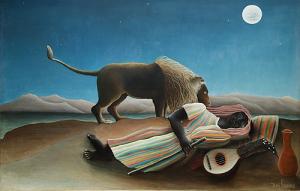
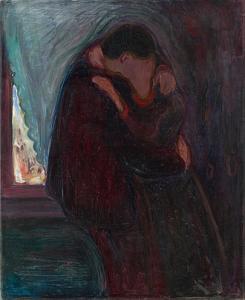
News of the World
Secret Origin of the Mystery Airships! The second wave of airship sightings, largely in the central and eastern US, took place from January 22 to late May of 1897.
- February 10 – Freedom of religion is proclaimed in Madagascar.
- President: Grover Cleveland (D–New York) (until March 4)
William McKinley (R–Ohio) (starting March 4) March 4, 1897 – September 14, 1901
- April 15 – Drillers near Bartlesville, Oklahoma strike oil for the first time, in the designated “Indian Territory”, on land leased from the Osage Indians. The gusher, at the Nellie Johnstone Number One well, leads to rapid population growth.
April 19, 1897 –Leo Taxil’s Masonic Revelations On April 19, 1897, in Société de Géographie, Léo Taxil called a press conference at which, he claimed, he would introduce Diana Vaughan to the press. At the conference instead he announced that his revelations about the Freemasons were fictitious. He thanked the Catholic clergy for their assistance in giving publicity to his wild claims.
Taxil’s confession was printed, in its entirety, in the Parisian newspaper Le Frondeur, on April 25, 1897, titled: Twelve Years Under the Banner of the Church, The Prank Of Palladism. Miss Diana Vaughan–The Devil At The Freemasons. A Conference held by M. Léo Taxil, at the Hall of the Geographic Society in Paris.
- April 30 – J. J. Thomson of the Cavendish Laboratory announces his discovery of the electron as a subatomic particle, over 1,800 times smaller than a proton (in the atomic nucleus), at a lecture at the Royal Institution in London.
- May 11 – A patent is awarded for the invention of the first automotive muffler, with the granting by the U.S. Patent Office of application number 582,485 to Milton Reeves and his brother Marshall T. Reeves, of the Reeves Pulley Company of Columbus, Indiana.
- May 31 – On Decoration Day (later Memorial Day) the Robert Gould Shaw Memorial is dedicated in Boston. The bronze bas relief by Augustus St. Gaudens depicts the 54th Massachusetts Infantry Regiment of black Civil War soldiers.
- June 22 – The Diamond Jubilee of Queen Victoria is celebrated in the United Kingdom. No other British monarch will celebrate such a jubilee until Elizabeth II in 2012.
- July 17 – The Klondike Gold Rush begins when the first successful prospectors arrive in Seattle.
- July 31 – Mount Saint Elias, the second highest peak in the United States and Canada, is first ascended.
- August 10 – At the Bayer pharmaceutical company, pharmacist Felix Hoffmann successfully synthesizes acetylsalicylic acid, after isolating a compound from a plant of the Spiraea family; the company markets it under the brand name “Aspirin“.
- August 21 – The Olds Motor Vehicle Co. is founded in Lansing, Michigan, by Ransom E. Olds
- August 31 – Thomas Edison is granted a patent for the Kinetoscope, a precursor of the movie projector.
Arrivals
- Thornton Wilder (April 17, 1897 – December 7, 1975)
- Moe Howard (1897–1975)
- A. W. Tozer, (April 21, 1897 – May 12, 1963) American Protestant pastor
- Frank Capra, American film producer, director and writer (May 18, 1897 – September 3, 1991)
- Dorothy Day – (November 8, 1897 – November 29, 1980)
- Bud Abbott (1897–1974
- Lucky Luciano – (November 24, 1897 – January 26, 1962)
- Frank Luke (May 19, 1897 – September 29, 1918)
Departures
Dr. St. Thérèse of Lisieux OCD (January 2, 1873 – September 30, 1897)
- The Corbett-Fitzsimmons Fight is an 1897 documentary film directed by Enoch J. Rector depicting the 1897 boxing match between James J. Corbett and Bob Fitzsimmons in Carson City, Nevada on St. Patrick’s Day. Originally running for more than 100 minutes, it was the longest film released to date; as such, it was the world’s first feature film. youtube.com)
- On the Roofs (Sur les toits cambrioleurs et gendarmes, 1897) ㅡ Georges Méliès (youtube.com)
- 1897 Pillow Fight (1897) Edison – YouTube
- 9 Lumiere Leaving Jerusalem By Railway (youtube.com)
- The Last Cartridges : Georges Méliès : Free Download, Borrow, and Streaming : Internet Archive
Publications Hot of the Press
- January 2 – Newspapers in London erroneously report the death of Mark Twain. It is believed the rumors began when Twain’s cousin had become ill. Twain makes his famous statement, “The report of my death was an exaggeration.”
- April–December – H. G. Wells‘ science fiction novel The War of the Worlds is serialized in Pearson’s Magazine (London).
- May 26 – Irish-born theatrical manager Bram Stoker‘s contemporary Gothic horror novel Dracula is first published (in London); it will influence the direction of vampire literature for the following century.
- July 25 – Writer Jack London sails to join the Klondike Gold Rush, where he will write his first successful stories.
- May 19 – Oscar Wilde is released early this morning from Pentonville Prison in London, to which he has been transferred from Reading via Twyford the previous night. This afternoon he visits Hatchards bookshop briefly before catching an evening train to Newhaven, on his way to exile on the continent under the pseudonym “Sebastian Melmoth”.
- September 21 – Francis P. Church responds (anonymously) to a letter to the editor of The Sun (New York City) that is known as the famous “Yes, Virginia, there is a Santa Claus” letter.
- December 12 – The comic strip The Katzenjammer Kids debuts in the New York Journal.
- December 28 – The play Cyrano de Bergerac, by Edmond Rostand, premieres in Paris.
- H. G. Wells – The Invisible Man
- L. Frank Baum – Mother Goose in Prose
- Rudyard Kipling
- E. Nesbit – The Children’s Shakespeare
Good Sports
- March 17, 1897— Bob Fitzsimmons knocks out James J. Corbett in the 14th round to win the World Heavyweight Championship in the first championship fight ever captured on film.
- The first regular motor racing venue is Nice, France, where an annual “Speed Week” is established. To fill out the schedule, most types of racing event are invented here including the first hill climb, from Nice to La Turbie, and a sprint that has been called the forerunner of drag racing.
Sanctifying Time
- Affari Vos – On the Manitoba School Question, by Pope Leo XIII, 8 December 1897
- Divinum Illud Munus – On the Holy Spirit, by Pope Leo XIII, 9 May 1897
- Militantis Ecclesiae – On Saint Peter Canisius, by Pope Leo XIII, 1 August 1897
- Officiorum ac Munerum – The Prohibition and Censorship of Books, by Pope Leo XIII, 25 January 1897
The Sound of Music and Other Cultural Milestones
May 14 – The Stars and Stripes Forever, an American patriotic march by John Philip Sousa, is performed for the first time.
“Beautiful Isle of Somewhere” w. Mrs Jessie Brown Pounds m. John S. Fearis
1898
Picture This
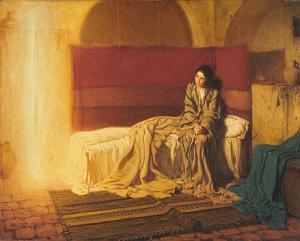
Herbert James Draper – The Lament for Icarus

News of the World
- January 1 – New York City annexes land from surrounding counties, creating the City of Greater New York as the world’s second largest. The city is geographically divided into five boroughs: Manhattan, Brooklyn, Queens, The Bronx and Staten Island.
- March 16 – In Melbourne the representatives of five colonies adopt a constitution, which will become the basis of the Commonwealth of Australia.
- March 24 – Robert Allison of Port Carbon, Pennsylvania, becomes the first person to buy an American-built automobile, when he buys a Winton automobile that has been advertised in Scientific American.
- April 5 – Annie Oakley promotes the service of women in combat situations, with the United States military. On this day, she writes a letter to President McKinley “offering the government the services of a company of 50 ‘lady sharpshooters’ who would provide their own arms and ammunition should war break out with Spain.”
- April 25 – Spanish–American War: The United States declares war on Spain; the U.S. Congress announces that a state of war has existed since April 21 (later backdating this one more day to April 20).
- June 19 – Food processing giant Nabisco is founded in New Jersey.[page needed]
- June 21 – Spanish–American War: The United States captures Guam, making it the first U.S. overseas territory.
- July 3 – American adventurer Joshua Slocum completes a 3-year solo circumnavigation of the world
- August 28 – American pharmacist Caleb Bradham names his soft drink Pepsi-Cola
- November 10 – The Wilmington insurrection of 1898, a coup d’état by the white Democratic Party of North Carolina, begins.
- November 26 – A two-day blizzard known as the Portland Gale piles snow in Boston, severely impacting the Massachusetts fishing industry and several coastal New England towns.
Arrivals
- Arthur Owen Barfield (November 9, 1898 – December 14, 1997) was a British philosopher, author, poet, critic, and member of the Inklings.
- C. S. Lewis (November 29, 1898 – November 22, 1963)
- Hugh O’Flaherty (February 28, 1898, – October 30, 1963)
- Edward Dowling (priest) – Wikipedia (1898–1960),
- H.L.. Rey September 16, 1898 – August 26, 1977)
Departures
- Lewis Carroll (January 27, 1832 –January 14,1898) Lewis Carroll and I share the same birthday.
- William Chatterton Dix – Wikipedia (14 June 1837 – 9 September 1898)
- La Passion/The Passion (Auguste & Louis Lumière, 1898) (youtube.com)
- The Four Troublesome Heads (Un Homme de Têtes, 1898) ㅡ Georges Méliès (youtube.com)
- The Miller And The Sweep – YouTube
- Santa Claus (1898) – G.A. Smith | BFI National Archive (youtube.com)
On the Airwaves
Publications Hot of the Press
- Henry James – The Turn of the Screw (novella in The Two Magics)
- J. Meade Falkner – Moonfleet
- H. G. Wells – The War of the Worlds (book publication)
- Garrett P. Serviss – Edison’s Conquest of Mars (serialization)
- Kenneth Grahame – Dream Days (dated 1899)
- K. Langloh Parker – More Australian Legendary Tales
- Emilio Salgari – Il Corsaro Nero (The Black Corsair – first in the Black Corsair series of five books)
- Ernest Thompson Seton – Wild Animals I Have Known
Good Sports
- American Football: The Morgan Athletic Club, which will eventually become Arizona Cardinals, is founded in Chicago and is the sport’s oldest professional team.
- Both the Football League First and Second Divisions are expanded from 16 to 18 teams in 1898, bringing the total number of League sides to 36. Additionally, the test match system is abandoned in favour of automatic relegation and promotion. There is no relegation from the First Division in 1898, Burnley and Newcastle United being promoted to increase the number of teams to 18. To increase the size of the Second Division, Burslem Port Vale is restored to the League; Barnsley, Glossop (1898–1915) and New Brighton Tower (1898–1901) are elected for the first time.
- 22 April — multiple no-hitters are thrown on the same day by two players: Ted Breitenstein and Jay Hughes.
- 23 April – The 23rd Street YMCA of New York City wins the first national basketball championship tournament, organized by the U.S. Amateur Athletic Union (AAU)
Sanctifying Time
- Caritatis Studium – On the Church in Scotland, by Pope Leo XIII, 25 July 1898
- Diuturni Temporis – On the Rosary, by Pope Leo XIII, 5 September 1898
- Quam Religiosa – On Civil Marriage Law, by Pope Leo XIII, 16 August 1898
- Quum Diuturnum – On the Latin American Bishops’ Plenary Council, by Pope Leo XIII, 25 December 1898
- Spesse Volte – On the Suppression of Catholic Institutions, by Pope Leo XIII, 5 August 1898
The Sound of Music and Other Cultural Milestones
- “My Old New Hampshire Home” w. Andrew B. Sterling m. Harry Von Tilzer
- “When You Were Sweet Sixteen” w.m. James Thornton
1899
Picture This
Summer Evening at Skagen Beach – The Artist and his Wife,
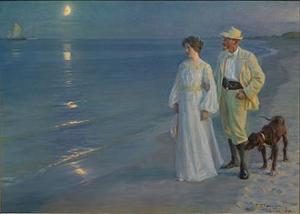
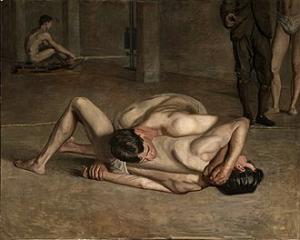
Jean Leon Gerome Ferris – Signing the Mayflower Compact
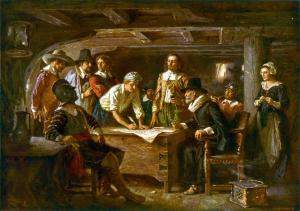
News of the World
- January 14 -The White Star Line‘s transatlantic ocean liner RMS Oceanic is launched from the Belfast shipyards in Ireland. At 17,272 gross register tons and 704 ft (215 m), she is the largest ship afloat at this time.
- January 17 – The United States takes possession of Wake Island in the Pacific Ocean.
- February 4 – The Philippine–American War begins as hostilities break out in Manila.
- February 5 – The first major battle of the Philippine–American War concludes with the capture by the U.S. of the San Juan River Bridge that connects Manila and San Juan.[
- February 6 – A peace treaty between the United States and Spain is ratified by the United States Senate to end the Spanish–American War.
- March 11
- The world’s first wireless distress signal is sent by wireless telegraphy (in Morse code) to the East Goodwin light vessel when German cargo-carrying barquentine Elbe runs aground in fog in the English Channel.
- Waldemar Jungner files the patent application for the first alkaline battery and receives a Swedish patent.
- March 18 – Phoebe, the ninth-known moon of the planet Saturn is discovered by U.S. astronomer William Pickering from analysis of photographic plates made by a Peruvian observatory, the first discovery of a satellite photographically.
- March 20 – At Sing Sing prison in Ossining, New York, Martha M. Place becomes the first woman to be executed in an electric chair.
- April 7 – The Shootout at Wilson Ranch, the last major gunfight of the Wild West era in the U.S., takes place in Tombstone, Arizona. Brothers William Halderman and Thomas Halderman, kill two lawmen. They will be hanged on November 16, 1900.
- May 31 -The Harriman Alaska Expedition is launched.
- June 2 – American outlaws Robert L. Parker (Butch Cassidy) and Harry A. Longabaugh (“The Sundance Kid“) commit their first armed robbery as “The Wild Bunch“, stopping a Union Pacific train near Wilcox, Wyoming, with accomplices Harvey Logan and Elzy Lay, and steal more than $30,000 worth of cargo.
- June 27 -A patent for a form of paperclip is applied for by Norwegian inventor Johan Vaaler but it is never put into production.
- July 4 – The most famous skeleton of a dinosaur ever found intact, a diplodocus, is discovered at the Sheep Creek Quarry near Medicine Bow, Wyoming. The expedition team, financed by Andrew Carnegie for the Carnegie Museum of Natural History and led by William Harlow Reed, bestows the name “Dippy” on the Diplodocus carnegii. It becomes well known after Carnegie has plaster cast replicas made for donation to museums all over the world.
- October 18 – The Boxer Rebellion begins in China as the Battle of Senluo Temple is fought between more than 4,000 Imperial Chinese Army troops and at least 1,000 rebels from the Society of Righteous and Harmonious Fists.
- Riro, last of the Kings of Easter Island, on a visit to Valparaíso, Chile, dies either from alcohol poisoning, or an assassination plot by the Chilean government.
Arrivals
- Al Capone January 17, 1899 – January 25, 1947)
- Fred Astaire (May 10, 1899 – June 22, 1987)
- Ernest Hemingway (July 21, 1899 – July 2, 1961)
- P. L. Travers, Author of Mary Poppins dies (August 9, 1899 – 23 April 23, 1996)
- Alfred Hitchcock (August 13, 1899 – April 29,1980)
- Charles Laughton (July 1, 1899 – December 15, 1962)
- James Cagney July 17, 1899 – March 30, 1986)
- Pat O’Brien (November 11, 1899 – October 15, 1983)
- Humphrey Bogart (December 25, 1899 – January 14, 1957)
Departures
Catharine Parr Traill (January 9, 1802 –August 29, 1899)
Geert Adriaans Boomgaard
(September 21, 1788; baptized September 23, 1788– February 3, 1899)
She was a Dutch supercentenarian and is generally accepted by scholars as the first validated case on record.
Daniel “Doc” Adams (November 1, 1814 – January 3, 1899)
In 2016, experts verified the authenticity of a set of documents titled “Laws of BaseBall” written in 1857 by New York Knickerbockers president Daniel “Doc” Adams after a discussion with executives of 14 other New York-area clubs. The documents established the rules of the game, including – for the first time – nine innings, nine players on the field and 90-foot basepaths. Cartwright was not a participant at the 1857 meeting, as he was living in Hawaii.
March 30 or March 31 – Robert Bunsen, German chemist, inventor (1811 . 1899)
The Devil in a Convent – Le Diable au Convent (1899) Georges Méliès (youtube.com)
Cinderella (1899) Georges Méliès (youtube.com)
King John (1899) – First ever Shakespeare film – YouTube
1899 early film kiss – ‘The Kiss in the Tunnel’ | BFI National Archive (youtube.com)
Publications Hot of the Press
- L. Frank Baum – Father Goose: His Book
- E. Nesbit – The Story of the Treasure Seekers (first in the Bastable series)
- Ethel Pedley – Dot and the Kangaroo
- Leo Tolstoy – Resurrection
- H.G. Wells – “The Sleeper Awakes“
- Joseph Conrad – serializations in Blackwood’s Magazine
- Heart of Darkness (February–April)
- Lord Jim (October 1899–November 1900)
- Stephen Crane – The Monster and Other Stories
- Kate Chopin – The Awakening
- May – Jack London‘s first published work, the short story “A Thousand Deaths“, appears in The Black Cat; its acceptance convinces London that he can make a living from literature.
- November 6 – William Gillette‘s play Sherlock Holmes, based (with authorisation) on the writings of Arthur Conan Doyle, opens in New York City with himself in the title rôle.
Good Sports
- Cleveland Spiders finish last in the twelve-team NL and establish an all-time major league record with 134 losses in a season, 84 games behind the pennant winner and 35 games out of 11th place. The team plays 113 games on the road, losing a record 102. They are dropped during the off-season when the National League contracts from twelve to eight teams.
- Kansas played their first men’s basketball game against the Kansas City YMCA, losing 5–16. The Jayhawks were coached by the inventor of basketball James Naismith. Kansas quickly became one of the most prestigious college basketball programs in the nation.
- June 9 – American boxer James J. Jeffries wins the world heavyweight boxing championship when he knocks out Cornish-born Bob Fitzsimmons at Coney Island, New York.
- June 27 – A. E. J. Collins, a 13-year-old schoolboy, makes the highest-ever recorded individual score in cricket, 628 not out. His record will stand for 117 years.
- June 30 – ‘Mile-a-Minute Murphy‘ earns his nickname after he becomes the first man to ride a bicycle for one-mile (1.6 km) in under a minute, on Long Island. Murphy pedals his bike one mile in 57.8 seconds for an average speed of 62.28 miles per hour
- August 10 – Marshall “Major” Taylor wins the world 1-mile (1.6 km) professional cycling championship in Montreal, securing his place as the first African American world champion in any sport.[
Sanctifying Time
- miraculous cure at Lourdes of Rose Labreuvoies Francois
- Saint Bede the Venerable declared a Doctor of the Church
- Saint Gemma Galgani begins to receive the stigmata
- June 11 – Pope Leo XIII issues a declaration of the consecration of the entire human race to the Sacred Heart of Jesus. The consecration follows the issuance of his papal encyclical Annum sacrum, declaring 1900 to be a Holy Year and directing all Roman Catholic churches in the world to implement the Prayer of Consecration to the Sacred Heart during the period of June 9 to June 11, 1899.
The Sound of Music and Other Cultural Milestones
- September 18 – Scott Joplin‘s Maple Leaf Rag is registered for copyright as ragtime music enjoys mainstream popularity in the United States.
Next Time on
HOARATS
To Understand
What I love and How I Write About History
Hit the Link Above.
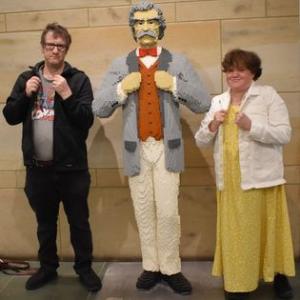
To understand about this particular series I’m writing about, please read
The Catholic Bard’s Guide To History Introduction
And to view a historical article click on


